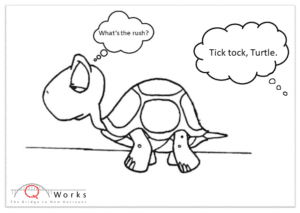Major Reason Companies Lose Good Job Candidates: Taking too Long!
rw-admin | 09/21/2018

This fact cannot be stressed enough; when the interview and hiring process drags on and on, top talent will give up and move on to other opportunities. A candidate-driven market naturally places candidates in the driver’s seat, thus shifting power away from the hiring company. This is especially true when it comes to those hard to fill positions. Very technical or specifically skilled types of jobs are in abundance right now, thanks to low unemployment; a strong economy as company’s grow and expand their workforce. The right people needed to fill these positions are in short supply. Employers should examine all areas that may increase their chances of attracting and hiring these highly sought-after individuals.
One major reason companies lose out on the most qualified talent lies within their interview and hiring process. An overly lengthy process can drive job seekers away FAST! How do we know this? In addition to years of listening to our own candidates, the Time to Hire report, in which workers were surveyed by an independent research firm points out:
- 57% say the most frustrating part of the job search is the long wait after an interview to hear if they got the job.
- Almost 25% lose interest in an organization if they don’t hear back within one week
- Nearly 50% lose interest if there’s no status update within two weeks
- When faced with a lengthy hiring process (defined by workers as 2-4 weeks), 39% lose interest and pursue other roles, while 18% decide to stay put in their current job.
- 32% say a long-drawn-out hiring process makes them question the organization’s ability to make other important decisions.
The longer a company takes to decide, the more likely top-level candidates will be snatched-up by a competitor. In addition to that, there are other detrimental effects on an organization when positions remain open for extended periods of time due to delays related to recruiting and hiring such as:
- Loss of innovation, productivity and revenue. When important positions remain vacant, that means no innovation, production, contribution or revenue can be generated from that person. If it remains open for a significant amount of time, you can see how it adds up.
- Damaging employer brand (image). Slamming a company for having poor interview procedures on Glassdoor or other online review sites will ultimately affect the quality of future job applicants. Having a bad reputation in this area will potentially scare away future employees. Job seekers go online and research companies before the interview. That is a fact today. If they think an organization is going to string them along for months, chances are they may not even proceed with the interview.
- Impact on other, current employees. Most of the time when there is a vacancy, someone must pick up the slack. This tends to stretch those employees too thin leading to stress and dissatisfaction at the minimum. Being asked to do double duty and/or overtime, will negatively impact their morale and retention rates.
This is by no means an exhaustive list of the negative impact on companies. And of course, each company is different and have different procedures in place for many reasons. Hiring the right people should never be taken lightly or rushed into by any means. We all know by know the flip side of this story, which is what happens when companies hire the wrong people and how detrimental that can be to the bottom line.
The key here is to realize that good, quality, top talent has options in the marketplace right now. They are not going to wait around too long for companies to make decisions. If you can tighten up your process, there is a greater likelihood you will keep those most desirable candidates engaged and interested. Here are a few tips.
5 Ways to keep the process moving:
- Clearly define your needs before you begin recruiting. Are there obstacles in place that would prevent you from hiring someone immediately? If so, consider your timing.
- Organize the decision makers from the beginning. Anticipate and block calendar time for interviews. Make sure all parties are in agreement i.e. salary, start date, job descriptions etc.
- Interview smarter, not harder. After screening conversations via phone, consider technology platforms, such as SKYPE or FaceTime for initial interviews. Schedule multiple in-person meetings on the same day and so forth.
- Keep communication flowing. After each step in the interview process, communicate with your recruiter, who can then keep the candidate informed. Candidates desire immediate feedback. Be able to provide an accurate timeline on the decision process all along the way.
- MAKE THE OFFER. Getting tied up in hiring procedures can make extending an offer difficult. If you have a candidate you don’t want to get away, go ahead and close the deal! Extend a verbal offer – contingent on A, B, and C. Go ahead and discuss the salary, perks, start date and why they want to work for your company. This keeps the candidate fully engaged.
And finally, we suggest having an honest conversation with your external recruiter who can provide insight and an outside opinion on areas that can be improved upon. If you consider how many different clients your recruiter partners with, you can begin to appreciate how much they see, hear and learn about what works and what doesn’t work.
Written By: Angie Barnes, The Q Works Group
